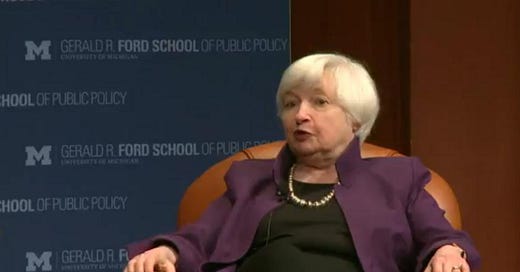"But you were always a good man of business, Jacob," faltered Scrooge, who now began to apply this to himself.
"Business !" cried the ghost, wringing its hands again. "Mankind was my business. The common welfare was my business ; charity, mercy, forbearance, and benevolence, were, all, my business. The dealings of my trade were but a drop of water in the comprehensive ocean of my business !"
Charles Dickens - A Christmas Carol
“Wisdom in many areas will always be a minority position”
Remember, the CPI does not measure the cost of living…
“For a lot of people, health insurance costs equal premiums, according to Stephen Juneau, senior economist at Bank of America Securities. BofA is a Marketplace underwriter.
“Everyone’s looking at their pay stubs, and you’re getting kind of updated premiums from your employer,” he said. [Not to mention self-employed folks who must pay their own premiums - rh]
Those went up this year — by about 7% — according to the Kaiser Family Foundation. Yet the health insurance index as measured by the CPI went down this year.
That’s because it doesn’t track health coverage premiums, said Steve Reed, an economist for the CPI program at the BLS. “It’s a little more complicated than one might expect or hope,” he said.”
"CPI health insurance methodology"
“The CPI measures health insurance inflation using an indirect method. The indirect method views health insurance as a composite good. Total premiums pay for insurance services (risk protection, claim processing, etc.) and medical goods and services through the insurer reimbursements to providers. Rather than pricing the full premium of health insurance plans, the CPI prices the services provided by the health insurer measured by the portion of the total premium that isn’t used to indirectly purchase medical goods and services. The premiums minus benefits spending is known as the retained earnings.”
You got all that?
None Dare Call It QE
‘I Worry About The Treasury Market’
“Mushrooming government liabilities usher in a similar sea-change on Wall Street. Bloomberg points out that the roster of primary dealers (i.e., U.S. Treasury-designated counterparties who are obliged to bid in all auctions at “reasonably competitive prices”) stands at 22 firms, roughly half its 1988 peak.
Though a wave of industry consolidation partially explains the downshift, the fast-rising stack of marketable Treasury debt, which stands at $28.8 trillion, alongside a burdensome post-2008 regulatory regime, serves to diminish the appeal of that imprimatur for some industry players. Witness Citadel’s September decision not to pursue primary dealer status.
“Issuance has gone up almost threefold in the last 10 years and the anticipation is for it to [reach] $50 trillion outstanding in the next 10 years, whereas dealer balance sheets haven’t grown at that magnitude,” Casey Spezzano, head of the New York Fed-sponsored Treasury Market Practices Group, told Bloomberg. “You’re trying to put more Treasurys through the same pipes, but those pipes aren’t getting any bigger.”
The likes of Citadel, Jane Street and Hudson River Trading – sophisticated electronic outfits who operate without the banking system’s post-2008 capital constraints – have duly stepped into the breach as market makers, yet that cadre may prove fair weather friends for Uncle Sam. “We’re now relying on principal trading firms to do a lot of the intermediation, but they’re. . . not obligated to make prices” in periods of turmoil, Vanguard senior portfolio manager John Madziyire observes. “I worry about the Treasury market.””
“The US is still a great nation, and it’s where I choose to live, not out of necessity or inertia, but because I want to be here. I want to be here for its wealth, its vastness, its independence, its openness, its convenience, its safety, and most of all for its optimism, which while hard to see at times, is there, simmering beneath the surface drawing the hopeful of the world, like moths to a flame, to line up at our embassies hoping to get a green card and a chance at a better life.”
Happy New Year! I haven’t paid any attention to the markets this week, and it’s been great. I had a few very nice days of R&R with some friends, and am ready to wade back into the absurdity. Time for a new post. Some highlights:
People still love bonds for some reason.
Check out Greg Weldon’s services inflation rant.
I discuss my aversion to the financial nihilism so prevalent today, using a clip of Jack Farley and Michael Howell.
Did you know that stock prices are elevated?
The usual housing news, plus very impressive office delinquencies.
Nice threads on H-1B visas and Private-Equity (a.k.a. leeches)
Credit card debt, single moms, and Karl Denninger on the health insurance racket.
Jay Powell, bailout queen.
A good Quentin Tarantino interview.
Aliens, etc. etc.
Keep reading with a 7-day free trial
Subscribe to A Havenstein Moment. to keep reading this post and get 7 days of free access to the full post archives.







